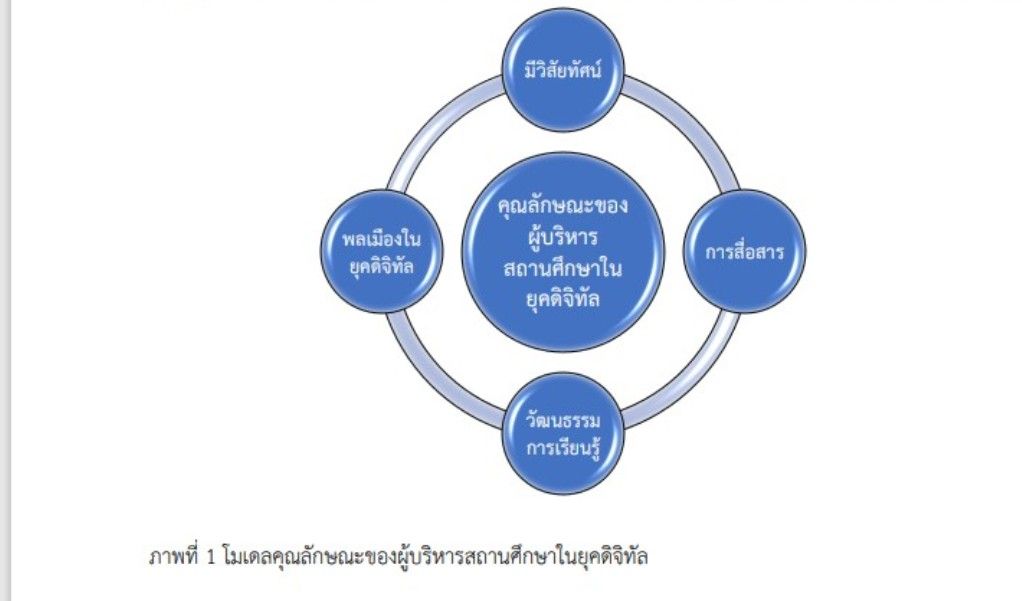คุณลักษณะผู้บริหารสถานศึกษายุคดิจิทัล
Main Article Content
บทคัดย่อ
บทความวิชาการนี้มีจุดมุ่งหมายเพื่ออธิบายและสังเคราะห์คุณลักษณะผู้บริหารสถานศึกษายุคดิจิทัล เป็นปัจจัยสำคัญในการบริหารสถานศึกษาให้เกิดประสิทธิภาพและประสิทธิผล ประกอบด้วย 4 ด้าน ดังนี้ 1) ด้านการมีวิสัยทัศน์ เป็นคุณลักษณะผู้บริหารสถานศึกษาที่แสดงออกมาด้วยการขับเคลื่อนองค์กรเพื่อตอบสนองนโยบาย ถ่ายทอดวิสัยทัศน์ บริหารจัดการข้อมูลสถานศึกษาผ่านระบบเทคโนโลยีสารสนเทศ 2) ด้านการสื่อสาร เป็นคุณลักษณะผู้บริหารสถานศึกษาที่แสดงออกมาด้วยการบริหารจัดการผ่านสื่อสังคมออนไลน์ 3) ด้านการสร้างวัฒนธรรมการเรียนรู้ เป็นคุณลักษณะผู้บริหารสถานศึกษาที่แสดงออกมาด้วยการเรียนรู้และเข้าถึงนโยบายอย่างต่อเนื่อง มีการสร้างเครือข่ายการเรียนรู้อย่างหลากหลาย ใช้เครื่องมือดิจิทัลแลกเปลี่ยนเรียนรู้และพัฒนาศักยภาพครู 4) ด้านการเป็นพลเมืองในยุคดิจิทัล เป็นคุณลักษณะผู้บริหารสถานศึกษาที่แสดงออกมาด้วยการเป็นแบบอย่างที่ดี รู้คุณค่าการใช้เทคโนโลยีที่มีต่อสังคม ตระหนักถึงคุณธรรม จริยธรรม ระเบียบ และกฎหมายหมายของสังคม
Article Details
เอกสารอ้างอิง
กระทรวงเทคโนโลยีสารสนเทศและการสื่อสาร. (2559). แผนพัฒนารัฐบาลดิจิทัลของประเทศไทย ระยะ 3 ปี (พ.ศ. 2559-2561). กรุงเทพฯ: สำนักงานรัฐบาลอิเล็กทรอนิกส์.
กระทรวงศึกษาธิการ. (2560). แผนการศึกษาแห่งชาติ พ.ศ. 2560 – 2579. กรุงเทพฯ: พริกหวานกราฟฟิก.
จุฬาลักษณ์ อักษรณรงค์ และกุหลาบ ปุริสาร. (2561). ปัจจัยที่ส่งผลต่อภาวะผู้นำเชิงเทคโนโลยีสารสนเทศของผู้บริหารสถานศึกษา สหวิทยาเขตหนองหาน สังกัดสำนักงานเขตพื้นที่การศึกษามัธยมศึกษา เขต 20 จังหวัดอุดรธานี. วารสารวิทยาลัยบัณฑิตเอเชีย, 8(2), 183-184.
ต้องลักษณ์ บุญธรรม. (2559). การเป็นผู้นำยุคเศรษฐกิจดิจิทัลกับการพัฒนาที่ยั่งยืนขององค์กรทางการศึกษา. วารสารวิชาการครุศาสตร์อุตสาหกรรมพระจอมเกล้าพระนครเหนือ, 7(1), 223 – 224.
บรรจง ลาวะลี. (2560). บทบาทของผู้บริหารสถานศึกษาในยุคไร้พรมแดน. วารสารมหาวิทยาลัยมหามกุฏราชวิทยาลัย วิทยาเขตร้อยเอ็ด, 6(2), 214.
ศิริพงษ์ กลั่นไพฑูรย์. (2564). รูปแบบการพัฒนาภาวะผู้นำทางวิชาการในยุคดิจิทัลของผู้บริหารสถานศึกษาขั้นพื้นฐาน. วิทยานิพนธ์ปริญญาศึกษาดุษฎีบัณฑิต สาขาวิชาการบริหารการศึกษา มหาวิทยาลัยนเรศวร.
สราวุธ นาแรมงาม. (2561). ผู้นำกับการขับเคลื่อนนโยบายประเทศไทย 4.0. กรุงเทพฯ: สำนักงาน-คณะกรรมการข้าราชการพลเรือน.
สำนักงานคณะกรรมการพัฒนาการเศรษฐกิจและสังคมแห่งชาติ. (2558). สำนักงานคณะกรรมการพัฒนาการเศรษฐกิจและสังคมแห่งชาติ. (2558). แผนพัฒนาเศรษฐกิจและสังคมแห่งชาติฉบับที่ 12 (พ.ศ. 2560-2564).กรุงเทพฯ: ภาพพิมพ์.
สุกัญญา แช่มช้อย. (2562). การบริหารสถานศึกษาในยุคดิจิทัล. กรุงเทพฯ: จุฬาลงกรณ์มหาวิทยาลัย.
เอกชัย กี่สุขพันธ์. (2563). คุณลักษณะยุคดิจิทัล. http://www.trueplookpanya.com//knowledge.
Eric Sheninger. (2019 : 78-79). Digital Leadership : Changing Paradigms for Changing Times. (2nd edition). California : SAGE Publications Asia-Pacific Pte. Ltd.
Flanagan, L., & Jacobsen, M. (2003). Technology leadership for the twenty-first century principal. Journal of Educational Administration, 41(2), 124-142.
Gardner, H. (2006). Five minds for the future. Bosston : Harvard Business School.
Kerdtip, C. (2006). Development model of education technology leadership for school administrators under the office of basic education commission in southern Thailand. (Doctoral Dissertation). Thailand: Songkla University.
Nak Ai, N. (2006). The factors of E-leadership characteristics and factors affecting E-Leadership effectiveness for basic education principals. (Doctoral Dissertation). Bangkok: Srinakharinwirot University.
Stewart M. (2015). The Language of Praise and Criticism in a Student Evaluation Survey. Studies in Educational Evaluation, 45(1), 1-9.
Stodd, J. (2014). 10 Reasons for social leadership. Retrieved August 1, 2019, from https://julianstodd.wordpress.com/2016/ 07/09/10-reasons-for-social leadership/
Woodward, O., & DeMille, O. (2015). What is social leadership? Retrieved August 1, 2020, from http://www.thesocialleader.com/socialleadership.
World Economic Forum. (2022). The 10 skills you need to thrive in the Fourth Industrial Revolution. https://www.weforum.org/agenda/2016/01/the-10-skills-you-need-to-thrive-in-the-fourth-industrial-revolution/


